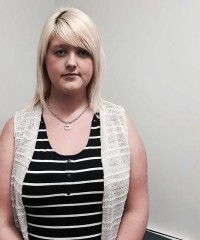
Sarah Ewart

Sarah Ewart is a Northern Irish woman who travelled to England for an abortion in 2013, having received the heartbreaking news at her 20-week scan that her baby had anencephaly and would not survive. Ewart is mounting a legal challenge to Northern Ireland’s restrictive abortion law, which prevented her from receiving the care she needed in her own country.
September 2018
MPs to vote on decriminalising abortion in Northern Ireland
On 23 October, Diana Johnson MP will bring a new bill to the House of Commons to decriminalise abortion in England, Wales and – crucially – Northern Ireland. The bill is co-sponsored by a cross-party group of MPs in response to growing calls for Westminster to address Northern Ireland’s archaic abortion law, which has been condemned by the Supreme Court and by UN Human Rights body CEDAW.
Women in Northern Ireland are threatened with life imprisonment for ending a pregnancy, including in cases of rape or fatal foetal anomaly. Last year nearly 1000 Northern Irish women travelled overseas to access abortion services. The new bill calls for the repeal of sections 58-59 of the Offences Against the Person Act of 1861 – the same law which still criminalises abortion in England and Wales.
Flour to be fortified with folic acid, to help prevent neural tube defects
After decades of campaigning by medical bodies and women’s healthcare charities, it has been announced that the government will introduce the mandatory fortification of flour with folic acid, a vitamin which helps prevent neural tube defects such as spina bifida. At present, the UK has one of the highest rates of neural tube defects in Europe, with around 1,000 pregnancies affected every year. Many of these cases will result in the painful decision to terminate a wanted pregnancy.
Folic acid can prevent neural tube defects, but only if taken extremely early in pregnancy or ideally before conception. Since around half of UK pregnancies are unplanned, many women will miss the window before realising they are pregnant. The fortification of flour is a simple public health intervention that will boost levels of folic acid in women by ensuring it enters foods that are widely consumed by the public.
First pregnancy sickness drug licensed
Last month saw the launch of Xonvea, the first nausea medication to be licensed in the UK specifically for use in pregnancy. At present, women suffering with pregnancy sickness are too often told that they must endure their symptoms, on the basis that there is no treatment safe for use in pregnancy. We are hopeful that this will give doctors the confidence to prescribe anti-sickness medication to pregnant women who need it. We blogged on the importance of this announcement, and its significance in writing pregnant women’s needs back into a foetus-centric script.
¾ NHS Trusts are flouting guidelines by denying women caesareans on request
A new report by UK charity Birthrights has found that only 1 in 4 NHS Trusts offers maternal request caesarean sections in line with NICE best-practice guidance. The report found that at the majority of Trusts the process of requesting a caesaren was lengthy, difficult or inconsistent, with women reporting dismissive, judgemental and even hostile responses from medical professionals.
It is unacceptable that a woman’s choice in childbirth should come down to a postcode lottery, or that she should be forced to negotiate a difficult and opaque process simply to access her preferred method. Women’s reasons for requesting a caesarean are many and varied – ranging from a previous traumatic birth experience, to a mental health issue, to a simple personal decision based on evidence. Their choices should be respected.
Champion of choice
Our champion this time is Sarah Ewart, a Northern Irish woman who travelled to England for an abortion in 2013, having received the heartbreaking news at her 20-week scan that her baby had anencephaly and would not survive. Ewart is mounting a legal challenge to Northern Ireland’s restrictive abortion law, which prevented her from receiving the care she needed in her own country.
